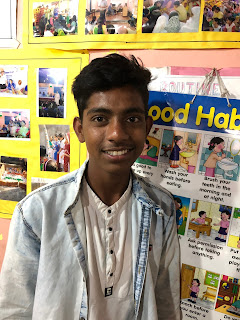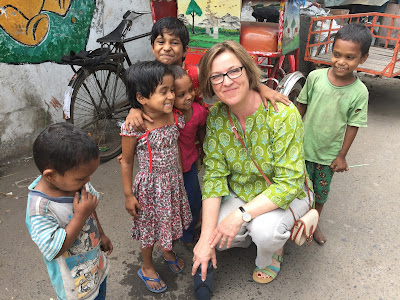The importance of a good education
Education is one of the most effective agents of change in society. When a child is able to go to school today, he or she sets off a cycle of positive change. But, thousands of children in India lack access to education and can’t even write their own names. (CRY India)
 |
| Rehan wants to be a software engineer |
This is Rehan. He is 14 years old and lives with his parents
in a makeshift shelter in the Topsia Canalside Squatter Camp, a narrow strip of
land with huge open sewers running down either side. There is no proper sanitation, no toilets and the
2 drinking water taps (for 710 families) operate for just a few hours a
day. Many of the residents here are rag
pickers but all work in the informal economy: rickshaw drivers, fruit sellers,
daily labourers. Illiteracy, child
marriage, child labour, domestic abuse, alcoholism and substance abuse are rife.
Rehan’s father is a rickshaw driver earning Rs3000 – 4000 (£33 - £44) per month.
His mother is a housewife. Rehan’s older siblings have all married and moved
away.
I met Rehan in Tiljala SHED’s Topsia community centre where he
and 37 other youngsters gather after school every day for computer classes,
remedial education evening classes and to meet as members of the Child Club. This group of young people astonished me:
they explained how they are guardians of child protection in the community, how
they recently had a child marriage stopped by going to the right authorities,
how they know which children are labouring rather than going to school, that
they know where abuse is happening. I
asked them about themselves. Rehan told
me he wants to be a software engineer. His friend Afsar is a talented dancer
and would like to make a living from dancing. “If that doesn’t work” he told me
“I want to be a policeman”. The girls
laughed when I asked about marriage. Their mothers were married in their mid-teens,
but the girls have bigger ambitions. Resham
wants to be a journalist and Saika a scientist.
Marriage is definitely not in the plan yet. All of them asked for English
lessons.
 |
| Resham wants to be a journalist |
 |
| Saika - future scientist |
Tiljala SHED is doing such amazing work in these desperately
deprived communities and the ambitions of these young people are, to me, a potent
sign of what can be done to lift society’s most vulnerable communities. There has never been, as far as we know, a
single university graduate come out of the Topsia Squatter camp. Rehan
and the others are determined to change that.
There is one more hero in this story. Rehan’s father. From
his meagre earnings he sends his son to a private English Medium School. It costs Rs600 (£6.70) per month and must be
a huge sacrifice for the parents. But
this is their investment in the future.
It is such a commonplace that the men in these communities
are so broken by hard physical labour and the shame of poverty that they turn
to drink and violence. “Oh, the husband is a useless fellow” my colleagues often
say when I interview the women. Rehan’s
father breaks the mould.
Tiljala SHED wants to do everything possible to support
Rehan, his father’s dreams and all the bright ambitious young people in Topsia
and the other rag picker communities where we work. But we need help desperately.
To provide each of the 600 children with remedial education,
the child protection activities, nutrition, sport, computer classes, occasional
excursions, access to healthcare etc. costs just Rs 1000 per month. Or £11per month per child
For a fraction of
what we in the UK would spend on an hour’s maths tuition you could give hope to
a rag picker’s child in Kolkata for a whole month.



Comments
Post a Comment